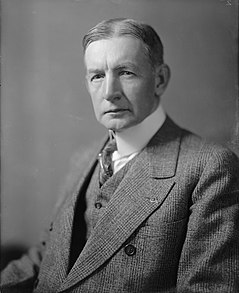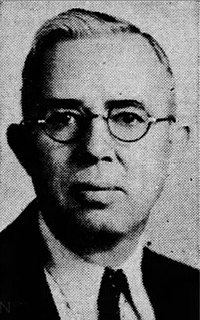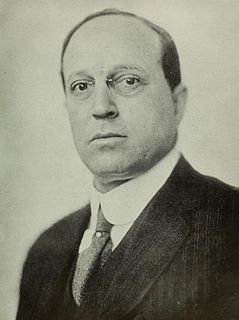 W
WCharles Gates Dawes was an American banker, general, diplomat, composer, and Republican politician who was the 30th vice president of the United States from 1925 to 1929. For his work on the Dawes Plan for World War I reparations, he was a co-recipient of the Nobel Peace Prize in 1925.
 W
WThe Emergency Relief and Construction Act, was the United States's first major-relief legislation, enabled under Herbert Hoover and later adopted and expanded by Franklin D. Roosevelt as part of his New Deal.
 W
WDan Edward Garvey was an American businessman, politician and the ninth secretary of state of Arizona from 1942 to 1948 under Sidney Preston Osborn and the eighth governor of Arizona from 1948 to 1951. He was the first of many people to ascend to the office of Governor from the Secretaryship.
 W
WCharles Belknap Henderson was an American attorney, businessman, and politician who served as United States Senator from Nevada.
 W
WJesse Holman Jones was an American Democratic politician and entrepreneur from Houston, Texas. Jones managed a Tennessee tobacco factory at age fourteen, and at nineteen, he was put in charge of his uncle's lumberyards. Five years later, after his uncle, M. T. Jones, died, Jones moved to Houston to manage his uncle's estate and opened a lumberyard company, which grew quickly. During this period, Jesse opened his own business, the South Texas Lumber Company. He also began to expand into real estate, commercial building, and banking. His commercial building activities in Houston included mid-rise and skyscraper office buildings, hotels and apartments, and movie theaters. He constructed the Foster Building, home to the Houston Chronicle, in exchange for a fifty percent share in the newspaper, of which he acquired control in 1926.
 W
WFrancis Patrick Matthews was an American who served as the 8th Supreme Knight of the Knights of Columbus from 1939 to 1945, the 50th United States Secretary of the Navy from 1949 to 1951, and United States Ambassador to Ireland from 1951 to 1952.
 W
WEugene Isaac Meyer was an American financier, public official, and newspaper publisher. He published The Washington Post from 1933 to 1946, and the paper stayed in his family throughout the rest of the 20th century. He served as Chairman of the Federal Reserve from 1930 to 1933 and was the first President of the World Bank Group.
 W
WHarvey Parnell was a farmer and politician from Southeast Arkansas. Parnell served in the Arkansas General Assembly for eight years, first in the Arkansas House of Representatives, and later serving a term in the Arkansas Senate. Following the re-establishment of the lieutenant governor position, Parnell won the statewide election and served under Governor John Martineau. When Martineau resigned to take a federal judgeship in March 1928, Parnell was elevated to become the state's 29th governor, a position he would hold until 1933. Early in his time as governor, Parnell was responsible for Progressive reforms popular with rural voters, including expansion and modernization of the highway system and public school reform. But as the Dust Bowl and Great Depression ravaged the Arkansas economy, Parnell's programs were blamed for bankrupting the state, and his popularity plummeted. He left politics after his second full gubernatorial term ended in January 1933.
 W
WAtlee Pomerene was an American Democratic Party politician from Ohio. He represented Ohio in the United States Senate from 1911 until 1923.
 W
WStanley Forman Reed was a noted American attorney who served as United States Solicitor General from 1935 to 1938 and as an Associate Justice of the U.S. Supreme Court from 1938 to 1957.
 W
WHubert Durrett Stephens was an American politician who served as a Democratic United States Senator from Mississippi from 1923 until 1935.
 W
WWilliam Stuart Symington III was an American businessman and Democratic politician from Missouri. He served as the first Secretary of the Air Force from 1947 to 1950 and was a United States Senator from Missouri from 1953 to 1976.